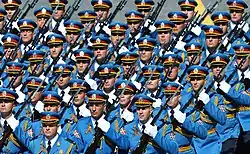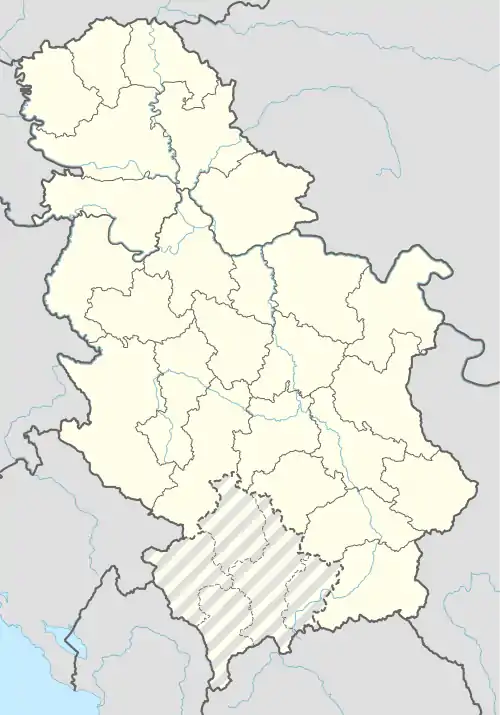Serbian Army
The Serbian Army (Serbian: Копнена војска Србије, romanized: Kopnena vojska Srbije, lit. 'Serbian Land Army') is the land-based component of the Serbian Armed Forces, responsible for defending the sovereignty and territorial integrity of Serbia from foreign hostiles; participating in peacekeeping operations; and providing humanitarian aid and disaster relief. Originally established in 1830, the Serbian army was incorporated into the newly established state of Yugoslavia in 1918. The current Serbian army has been active since 2006 when Serbia restored its independence.
| Serbian Army | |
|---|---|
| Копнена војска Србије Kopnena vojska Srbije | |
 The Serbian Army's coat of arms | |
| Active | 1808–present (current form since 2006) |
| Country | Serbia |
| Type | Army |
| Size | 40,000[1] |
| Part of | |
| Command HQ | King Alexander I Square, Niš |
| Anniversaries | November 16 |
| Engagements | Serbian Revolution Serbian-Turkish Wars (1876–1878) Russo-Turkish War Serbo-Bulgarian War Balkan Wars World War I Allied intervention in the Russian Civil War World War II Yugoslav Wars |
| Commanders | |
| Chief of the Staff | Lt. General Milosav Simović |
| Army Sergeant Major | Warrant officer 1st class Nenad Stević |
| Notable commanders | Fld. Marshal Radomir Putnik Fld. Marshal Stepa Stepanović Fld. Marshal Živojin Mišić Fld. Marshal Petar Bojović |
| Insignia | |
| Serbian Army flag |  |
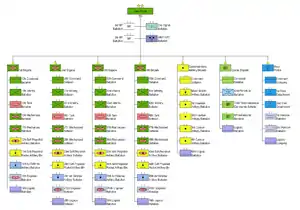
History
Current status
The Serbian Army is the largest component of the Serbian Armed Forces. There are approximately 17,850 active members and additional 50,000 in reserves.[2] The army is composed entirely of professionals and volunteers following the suspension of mandatory military service on January 1, 2011.
The 2nd, 3rd and 4th army brigades are tasked with securing the 5 km (2.5 mi) wide Ground Safety Zone (GSZ) along the administrative line between Central Serbia and the disputed territory of Kosovo[a]. The Ground Safety Zone extends 384 kilometres long and covers a total area of about 1,920 square kilometres. There are over 20 camps and security checkpoints in the zone.[3]
There are plans to increase the Serbian army's involvement in humanitarian and peacekeeping operations abroad.[4][5]
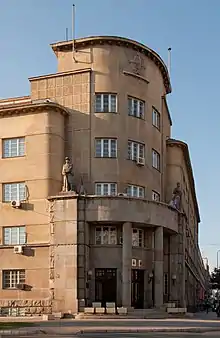
Formations and structure
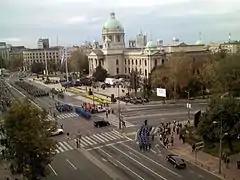
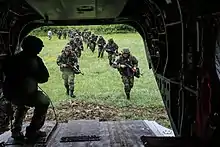
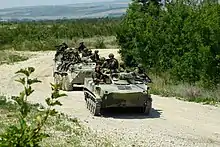
Following the 2019 reorganization, the Serbian Army consists of six primary brigades. The four army brigades are larger than a conventional modern brigade, their size is more akin to a division.That follows from the fact that each army brigade consists of ten battalions, unlike conventional modern brigade which consist of 3–6 battalions. Those 10 battalions are: one command battalion, one armored battalion, two mechanized battalions, two infantry battalions, one self-propelled artillery battalion, one self-propelled multiple rocket launcher artillery Battalion, one air defense battalion, one engineering battalion and one logistic battalion.
green pin – army brigades
- Army Command (Niš)
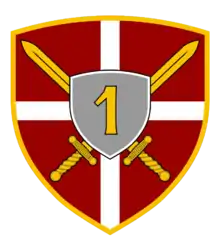 1st Brigade (Novi Sad)
1st Brigade (Novi Sad)
- 10th Command Battalion
- 11th Infantry Battalion
- 111th Infantry Battalion
- 12th Self-Propelled Artillery Battalion
- 13th Self-Propelled Multiple Rocket Launcher Artillery Battalion
- 14th Air-defense Artillery Battalion
- 15th Tank battalion
- 16th Mechanized Battalion
- 17th Mechanized Battalion
- 18th Engineer Battalion
- 19th Logistic Battalion
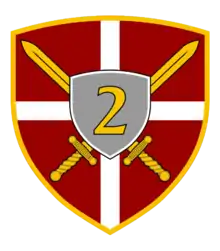 2nd Brigade (Kraljevo)
2nd Brigade (Kraljevo)
- 20th Command Battalion
- 21st Infantry Battalion
- 22nd Infantry Battalion
- 23rd Self-Propelled Artillery Battalion
- 24th Self-Propelled Multiple Rocket Launcher Artillery Battalion
- 25th Air-defense Artillery Battalion
- 26th Tank Battalion
- 27th Mechanized Battalion
- 28th Mechanized Battalion
- 29th Logistic Battalion
- 210th Engineer Battalion
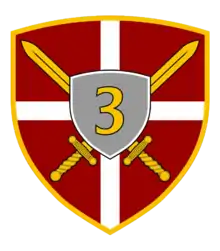 3rd Brigade (Niš)
3rd Brigade (Niš)
- 30th Command Battalion
- 31st Infantry Battalion
- 32nd Infantry Battalion
- 33rd Self-Propelled Howitzer Artillery Battalion
- 34th Multiple Multiple Rocket Launcher Artillery Battalion
- 35th Air-defense Artillery Battalion
- 36th Tank Battalion
- 37th Mechanized Battalion
- 38th Mechanized Battalion
- 39th Logistic Battalion
- 310th Engineer Battalion
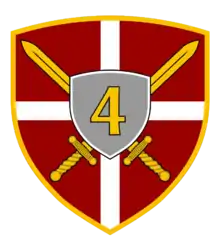 4th Brigade (Vranje)
4th Brigade (Vranje)
- 40th Command Battalion
- 41st Infantry Battalion
- 42nd Infantry Battalion
- 43rd Self-Propelled Howitzer Artillery Battalion
- 44th Self-Propelled Multiple Rocket Launcher Artillery Battalion
- 45th Air-defense Artillery Battalion
- 46th Tank Battalion
- 47th Mechanized Battalion
- 48th Mechanized Battalion
- 49th Logistic Battalion
- 410th Engineer Battalion
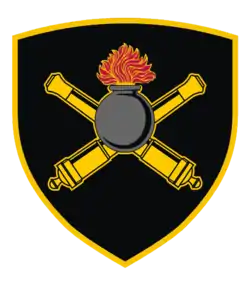 Mixed Artillery Brigade (Niš)
Mixed Artillery Brigade (Niš)
- Command Battalion
- Mixed Multiple Rocket Launcher Artillery Battalion
- 1st Howitzer-Cannon Artillery Battalion
- 2nd Howitzer-Cannon Artillery Battalion
- 3rd Howitzer-Cannon Artillery Battalion
- 69th Logistics Battalion
 River Flotilla (Novi Sad)
River Flotilla (Novi Sad)
- Command Company
- 1st River Detachment
- 2nd River Detachment
- 1st Pontoon Battalion
- 2nd Pontoon Battalion
- Logistic Company
Equipment
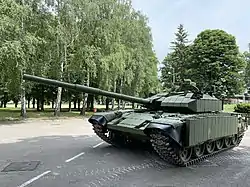
Armoured fighting vehicles
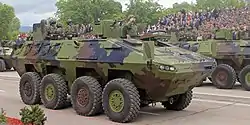
At the end of 2018 Serbian army had 414 tanks, this number will be increased by 30 T-72 tanks which are to be donated by Russia.[6]
- M-84 (212) main battle tank[7]
- T-72 (13+48) main battle tank
- T-54/T-55 (141) main battle tank (in storage), 60 were sold in 2010 to Cambodia,[8] 282 in 2015 (probably to Pakistan) and 30 donated to Iraq in 2017.[9][10][11] In 2018 Serbia sold 29 tanks to one arms exporter.[12]
- BVP M-80 (542) infantry fighting vehicle[13]
- BOV M-86 (52+) armoured personnel carrier (Used by military police.)[13]
- BOV KIV (10) with more on order.
- BTR-50 (30) armoured personnel carrier[13]
- BRDM-2 (36) light-armoured vehicle[13]
- Humvee (40) light-armoured vehicle[14]
- BOV M11 (12+) light-armoured vehicle[13]
- Lazar armored vehicle (8+) multi-role military vehicle[13]
- MT-LBu (32)
- MRAP M20 FAP 6x6
Artillery
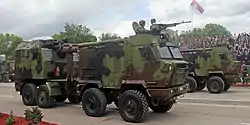
- D-30 howitzer (in storage)[13]
- M-46 field gun[13]
- M84 NORA howitzer[13]
- 2S1 Gvozdika[13]
- M-63 Plamen[13]
- M-77 Oganj[13]
- M-87 Orkan[13]
- Nora B-52[13]
- LRSVM Morava[13]
Anti-armour
- M79 Osa anti-tank missile launcher[13]
- M80 Zolja anti-tank missile launcher[13]
- Malyutka-2T with portable suitcase launcher (9P111) and 9M14-2T missile anti-tank missile system[15]
- Polo M-83 with 9M14-2T missile anti-tank missile system[15]
- 9K111 Fagot anti-tank missile system[13]
Air-defence
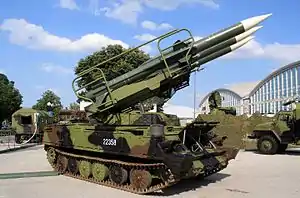
- Bofors L/70 autocannon, guided with M85 "GIRAFFE"[13]
- M53/59 Praga
- 9K31 Strela-1[13]
- 9K35 Strela-10[13]
- 9K38 Igla[13]
- Strela 2[13]
- Pantsir[13]
- Neva M[13]
- Kub M[13]
- Mistral (missile) M3 version
Small arms
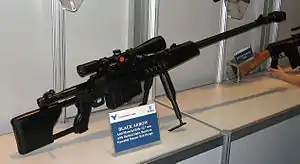
- CZ 99 pistol[13]
- CZ 999 pistol[13]
- Zastava M21 assault rifle[13]
- Zastava M70 assault rifle[13]
- Zastava M72 light machine gun[13]
- Zastava M76 sniper rifle[13]
- Zastava M84 general purpose machine gun[13]
- Zastava M91 sniper rifle[13]
- Zastava M93 Black Arrow anti-material rifle[13]
- BGA grenade launcher[13]
- M74/M75 mortar[13]
See also
Notes
| a. | ^ Kosovo is the subject of a territorial dispute between the Republic of Kosovo and the Republic of Serbia. The Republic of Kosovo unilaterally declared independence on 17 February 2008. Serbia continues to claim it as part of its own sovereign territory. The two governments began to normalise relations in 2013, as part of the 2013 Brussels Agreement. Kosovo is currently recognized as an independent state by 98 out of the 193 United Nations member states. In total, 113 UN member states recognized Kosovo at some point, of which 15 later withdrew their recognition. |
References
- http://www.pecat.co.rs/2015/03/miroslav-lazanski-doktrina-ministra-gasica/
- "2018 Serbia Military Strength". globalfirepower.com. Archived from the original on July 30, 2018. Retrieved May 5, 2018.
- "NATO for suspension of security zone in Kosovo". Blic Online. January 20, 2009. Archived from the original on February 16, 2009.
- "Plan of the Serbian Army participation in peace operations approved". International Radio Serbia. December 24, 2012. Archived from the original on January 2, 2014. Retrieved December 31, 2012.
- "Army improves Serbia's global reputation". B92. December 20, 2012. Archived from the original on January 2, 2014. Retrieved December 31, 2012.
- Srna (December 2, 2017). "Srbija od Rusije dobija 30 tenkova". Nezavisne novine (in Serbian). Retrieved May 8, 2019.
- sisteme, Vojska Srbije | Serbian Armed Forces :: Centar za komandno-informacione. "Војска Србије | Наоружање Копнене војске | Оклопно-борбена средства | Тенк М84". www.vs.rs. Archived from the original on January 5, 2012. Retrieved March 19, 2018.
- "SIPRI Arms Transfers Database | SIPRI". www.sipri.org. Archived from the original on March 16, 2018. Retrieved March 19, 2018.
- "SRBIJA RASPRODAJE NAORUŽANJE: Vojska nudi 480 tenkova, 220 oklopnih vozila, 200 haubica..." kurir.rs (in Serbian). Archived from the original on March 19, 2018. Retrieved March 19, 2018.
- Beta. "Vojska Srbije prodaje 480 tenkova, oklopnih vozila i drugo naoružanje". Politika Online (in Serbian). Archived from the original on March 20, 2018. Retrieved March 19, 2018.
- Lazanski, Miroslav. "Tenkovi na poklon". Politika Online (in Serbian). Archived from the original on January 28, 2018. Retrieved January 27, 2018.
- Tašković, M. "Srbija prodala 29 starih tenkova IZVOZNIKU ORUŽJA". Blic.rs (in Serbian). Retrieved May 8, 2019.
- "Armaments – armaments names in this reference are links with detailed explanation read them to clarify technical and other details". Serbian Armed Forces. Archived from the original on October 7, 2014. Retrieved April 10, 2019.
- "Course for operating off-road vehicles Hummer". Serbian Armed Forces. February 7, 2013. Archived from the original on January 16, 2014. Retrieved May 11, 2013.
- "Војска Србије – Наоружање Копнене војске – Противоклопна средства – Противоклопна вођена ракета МАЉУТКА". Archived from the original on January 16, 2013. Retrieved December 23, 2014.
External links
| Wikimedia Commons has media related to Army of Serbia. |
